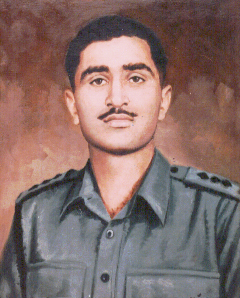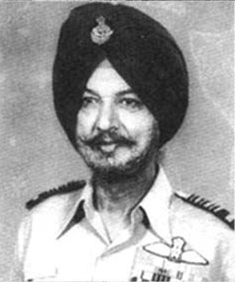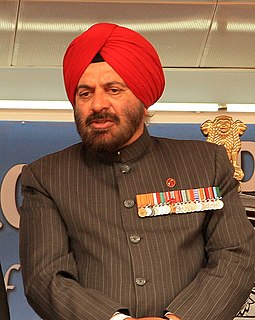 W
WBrigadier Kuldip Singh Chandpuri MVC, VSM was a decorated Indian Army officer. He is known for his leadership in the Battle of Longewala during the Indo-Pakistani War of 1971, for which he was awarded the Maha Vir Chakra, the second highest Indian military decoration, by the Indian government. The 1997 Hindi film Border was based on the battle, with his role played by Sunny Deol. He was a councillor in the Chandigarh Municipal Corporation from 2006 to 2011.
 W
WWing Commander Jag Mohan Nath, was an officer in the Indian Air Force. He is the first of the six officers to have been decorated with the Maha Vir Chakra, India's second highest war time military decoration, twice. He was decorated for his operations in the Sino-Indian War of 1962 and Indo-Pakistani War of 1965.
 W
WMaj-General Ranjit Lal Jetley, FIE, FIQA was an Indian soldier and scientist. He served in World War II and the 1947 Indo-Pakistani War, becoming an artillery regiment commander. He went on to work in armaments research and development, his innovations including an Indian 10mm light field gun and upgunning of the Sherman tanks. He also contributed to set up two major laboratories. Jetley retired in 1979 and moved to the United Kingdom.
 W
WGeneral Deepak Kapoor PVSM, AVSM, SM, VSM, ADC served as the 23rd Chief of Army Staff of the Indian Army, appointed on 30 September 2007 and Chairman, Chiefs of Staffs Committee appointed on 31 August 2009.
 W
WRavish Malhotra is a retired Air Commodore of the Indian Air Force. He was an Air Force test pilot stationed at the test centre in Bangalore. He was also the Air Officer Commanding of Hindon Air Force Station near Delhi.
 W
WMirza Ghulam Murtaza was an Indian nobleman, chief, military officer and physician, best known for being the father of Mirza Ghulam Ahmad, the founder of the Ahmadiyya movement. He belonged to a family of landed aristocracy within the Mughal Empire that lost most of its estate to the Sikh Kingdom during the late 18th century and only a fraction of which – including Qadian, the family’s ancestral seat – he was able to regain from it. He was mentioned in some detail by Sir Lepel Griffin in The Panjab Chiefs, a survey of the Punjab’s aristocracy. Ghulam Murtaza was married to Chiragh Bibi and had three surviving children.
 W
WAdmiral Sardarilal Mathradas Nanda, PVSM, AVSM was an Indian Navy Admiral who served as the 8th Chief of the Naval Staff from 1 March 1970 until 28 February 1973. He led the Indian Navy during the Indo-Pakistani War of 1971 and successfully executed a naval blockade of both West and East Pakistan, helping India achieve an overwhelming victory during the war. He is one of the most notable commanders in the history of the Indian Navy.
 W
WCaptain Gurbachan Singh Salaria, PVC was an Indian Army officer and member of a United Nations peacekeeping force. Singh was an alumnus of King George's Royal Indian Military College and the National Defence Academy. He was the first NDA alumnus and is the only UN Peacekeeper to be awarded a Param Vir Chakra (PVC), India's highest wartime military decoration.
 W
WBrigadier Narinder Singh Sandhu MVC was an Indian Army officer who was awarded the Maha Vir Chakra (MVC), the second-highest Indian military decoration, for gallantry, leadership and devotion to duty during the Indo-Pakistan War of 1971. Sandhu was commissioned into the Indian Army Armoured Corps in 1953, and participated in the Battle of Asal Uttar during the Indo-Pakistani War of 1965, and was mentioned in dispatches. He transferred to the Dogra Regiment in 1970, and it was for his performance as commanding officer of the 10th Battalion, Dogra Regiment during an assault on a fortified Pakistan Army position that he was awarded the MVC. He retired as a brigadier and was active in veterans' and gallantry award recipients' matters until his death of colorectal cancer in 2018.
 W
WBrig Sant Singh was an officer in the Indian Army. He was one of the six officers of the Indian Army to have been twice decorated with the Maha Vir Chakra, India's second highest war time military decoration. He was one of the Indian officers involved in training the Mukti Bahini, during the Indo-Pakistani War of 1971.
 W
WMarshal of the Indian Air Force Arjan Singh Aulakh, DFC was a senior air officer of the Indian Air Force. He served as the 3rd Chief of the Air Staff from 1964 to 1969, leading the Air Force through the Indo-Pakistani War of 1965. He was the first and only officer of the Indian Air Force (IAF) to be promoted to five-star rank as Marshal of the Indian Air Force, equal to the army rank of Field Marshal.
 W
WAir Chief Marshal Dilbagh Singh, PVSM, AVSM, VM was the head of the Indian Air Force from 1981 to 1984, as Chief of the Air Staff. He was the second Sikh to hold that position.
 W
WGeneral Joginder Jaswant Singh, PVSM, AVSM, VSM, ADC was the 22nd Chief of the Army Staff (COAS) of the Indian Army. He was appointed on 27 November 2004, and took over the role when his predecessor, General N C Vij, retired on 31 January 2005. He was succeeded by General Deepak Kapoor. He served as the COAS from 31 January 2005, to 30 September 2007.
 W
WSubedar Joginder Singh Sahnan, PVC, was an Indian Army soldier who posthumously received India's highest military gallantry award, the Param Vir Chakra. Singh joined the British Indian Army in 1936, and served in the 1st battalion of the Sikh Regiment. During the 1962 Sino-Indian War, he was commanding a platoon at the Bum La Pass in the North-East Frontier Agency. Though heavily outnumbered, he led his troops against a Chinese assault and defended his post until he was wounded and captured. Singh died from his injuries while in Chinese custody.He single-handedly killed more than 50 Chinese men and create a history in Indian Army.
 W
WSubedar and Honorary Captain Karam Singh PVC, MM, an Indian soldier, was a recipient of the Param Vir Chakra (PVC), India's highest award for gallantry. Singh joined the army in 1941, and took part in the Burma Campaign of World War II, receiving the Military Medal for his actions during the Battle of the Admin Box in 1944. He also fought in the Indo-Pakistani War of 1947, and was awarded the PVC for his role in saving a forward post at Richhmar Gali, south of Tithwal. He was also one of the five soldiers chosen to raise the Indian flag for the first time after independence in 1947. Singh later rose to the rank of subedar, and was conferred the rank of honorary captain before his retirement in September 1969.
 W
WGeneral Pran Nath Thapar was the fourth Chief of Army Staff of the Indian Army.
 W
WBhagat Singh Thind was an American writer and lecturer on spirituality who served in the United States Army during World War I and was involved in a Supreme Court case over the right of Indian people to obtain United States citizenship.